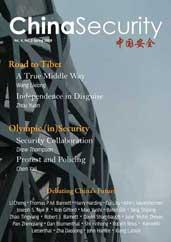Debating China's Future
with
Li Cheng, Thomas P.M. Barnett, Harry Harding, Cui Liru, John J. Mearsheimer, Joseph S. Nye Jr., Rob Gifford, Mao Yushi, Bates Gill, Tang Shiping, Zhao Tingyang, Robert J. Barnett, David Shambaugh, June Teufel Dreyer, Pan Zhenqiang, Dan Blumenthal, Shi Yinhong, Robert S. Ross, Kenneth Lieberthal, Zha Daojiong, John Hamre and Xiang Lanxin
Mao Yushi, Bates Gill, Tang Shiping, Zhao Tingyang, Robert J. Barnett, David Shambaugh, June Teufel Dreyer, Pan Zhenqiang, Dan Blumenthal, Shi Yinhong, Robert S. Ross, Kenneth Lieberthal, Zha Daojiong, John Hamre and Xiang Lanxin
CHINA SECURITY, VOL. 4, NO. 2, SPRING 2008
Thomas P.M. Barnett
The Inevitable Alliance
China’s main strategic vulnerability right now is that it possesses economic and network connectivity with the outside world that is unmatched by its political-military capacity to defend. This forces Beijing to “free ride” on Washington’s provision of global security services, a situation that makes China’s leaders uncomfortable today – as it should. American blood for Chinese oil is an untenable strategic transaction.
The United States faced a similar situation in its “rise” in the late 1800s and set about “rebranding” its military force over a several-decade period that culminated with a successful entry into World War I. Since World War II, the United States has maintained a primarily expeditionary force that is able to access international crises, and since the end of the Cold War has done so with unprecedented frequency. This too is an untenable strategic burden.
America needs to encourage China’s effective re-branding as an accepted worldwide provider of stability operations. The problem today is two-fold: 1) major portions of America’s military require China to remain in the enemy image to justify existing and new weapons and platforms; and 2) the Chinese military is hopelessly fixated on “access denial” strategies surrounding Taiwan, meaning it buys the wrong military for the strategic tasks that inevitably lie ahead.
So long as both nations insist on such mirror-imaging, their respective militaries will continue to buy one military while operating (or, in China’s case, needing to operate) another force that remains under-developed. Such strategic myopia serves neither great power’s long-term interests, which are clearly complimentary throughout the developing world.
The good news is that both China and the United States are within a decade’s time of seeing new generations emerge among their respective political and military leaderships. These future leaders view the potential for Sino-American strategic alliance far differently than do the current leadership generation. If Washington and Beijing can navigate the next dozen or so years without damaging current ties, I fully expect to see a Sino-American strategic alliance emerge.
I do not present this as a theoretical possibility, but as my professional judgment based on years of extensive contacts through both nations’ national security establishments.
Grand strategy often involves getting leaders to understand certain future inevitabilities. The global primacy of the Sino-American strategic alliance in the 21st century is one such future inevitability.
